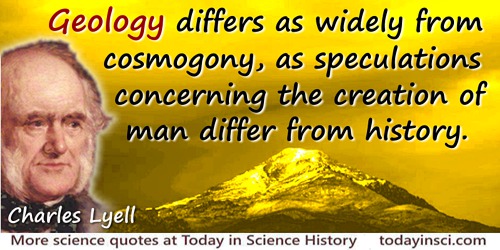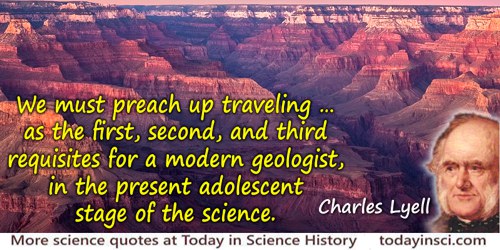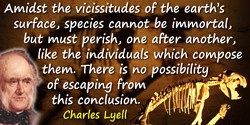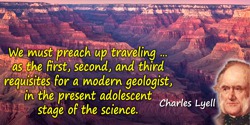 (source)
(source)
|
Sir Charles Lyell
(14 Nov 1797 - 22 Feb 1875)
Scottish geologist who promoted concepts of gradualism to replace the prevailing ideas of catastrophism. Lyell maintained that the Earth's features were, in fact, produced by continuing, gradual effects of natural forces.
|
Sir Charles Lyell Quotes on Geology (8 quotes)
>> Click for 34 Science Quotes by Sir Charles Lyell
>> Click for Sir Charles Lyell Quotes on | Science | Species |
>> Click for 34 Science Quotes by Sir Charles Lyell
>> Click for Sir Charles Lyell Quotes on | Science | Species |
[My Book] will endeavour to establish the principle[s] of reasoning in ... [geology]; and all my geology will come in as illustration of my views of those principles, and as evidence strengthening the system necessarily arising out of the admission of such principles, which... are neither more nor less than that no causes whatever have from the earliest time to which we can look back, to the present, ever acted, but those now acting; and that they never acted with different degrees of energy from that which they now exert.
— Sir Charles Lyell
Letter to Roderick Murchison Esq. (15 Jan 1829). In Mrs Lyell (ed.), The Life, Letters and Journals of Sir Charles Lyell, Bart (1881), Vol. 1, 234.
Geology differs as widely from cosmogony, as speculations concerning the creation of man differ from history.
— Sir Charles Lyell
Principles of Geology (1830-3), Vol. 1, 4.
Geology is intimately related to almost all the physical sciences, as is history to the moral. An historian should, if possible, be at once profoundly acquainted with ethics, politics, jurisprudence, the military art, theology; in a word, with all branches of knowledge, whereby any insight into human affairs, or into the moral and intellectual nature of man, can be obtained. It would be no less desirable that a geologist should be well versed in chemistry, natural philosophy, mineralogy, zoology, comparative anatomy, botany; in short, in every science relating to organic and inorganic nature. With these accomplishments the historian and geologist would rarely fail to draw correct and philosophical conclusions from the various monuments transmitted to them of former occurrences.
— Sir Charles Lyell
Principles of Geology (1830-3), Vol. 1, 2-3.
Geology is the science which investigates the successive changes that have taken place in the organic and inorganic kingdoms of nature; it enquires into the causes of these changes, and the influence which they have exerted in modifying the surface and external structure of our planet.
— Sir Charles Lyell
Principles of Geology (1830-3), Vol. 1, 1.
Millions of our race are now supported by lands situated where deep seas once prevailed in earlier ages. In many districts not yet occupied by man, land animals and forests now abound where the anchor once sank into the oozy bottom.
— Sir Charles Lyell
Principles of Geology (1837), Vol. 1, 237.
Notwithstanding, therefore, that we have not witnessed of a large continent, yet, as we may predict the future occurrence of such catastrophes, we are authorized to regard them as part of the present order of Nature.
— Sir Charles Lyell
Principles of Geology (1837), Vol. 1, 94.
There is no foundation in geological facts, for the popular theory of the successive development of the animal and vegetable world, from the simplest to the most perfect forms.
— Sir Charles Lyell
Principles of Geology (1830-3), Vol. 1, 153.
We must preach up traveling … as the first, second, and third requisites for a modern geologist, in the present adolescent stage of the science.
— Sir Charles Lyell
Letter (12 Jan 1829) to Roderick Murchison, collected in Katherine Murray Lyell (ed.), Life, Letters and Journals of Sir Charles Lyell, Bart. (1881), Vol. 1, 233-234.
See also:
- 14 Nov - short biography, births, deaths and events on date of Lyell's birth.
- Principles of Geology, by Charles Lyell. - book suggestion.
- Booklist for Charles Lyell.






 In science it often happens that scientists say, 'You know that's a really good argument; my position is mistaken,' and then they would actually change their minds and you never hear that old view from them again. They really do it. It doesn't happen as often as it should, because scientists are human and change is sometimes painful. But it happens every day. I cannot recall the last time something like that happened in politics or religion.
(1987) --
In science it often happens that scientists say, 'You know that's a really good argument; my position is mistaken,' and then they would actually change their minds and you never hear that old view from them again. They really do it. It doesn't happen as often as it should, because scientists are human and change is sometimes painful. But it happens every day. I cannot recall the last time something like that happened in politics or religion.
(1987) -- 


